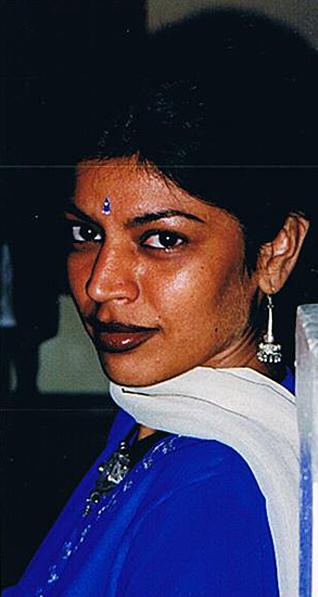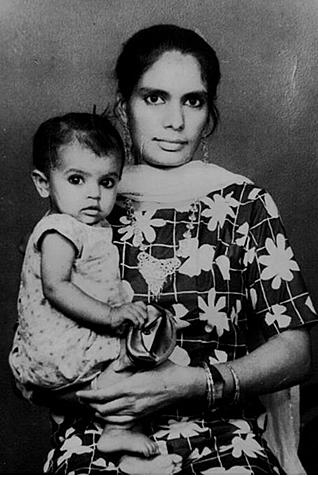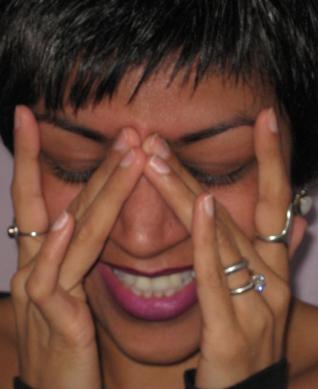
Below - all images are of the author. The second from bottom, however, is of her as a child, with her mother.



Books
Neesha Meminger's
"Shine, Coconut Moon"
A Book Review by MANJYOT KAUR
SHINE, COCONUT MOON, by Neesha Meminger. Margaret K. McElderry Books/Simon & Schuster Children's Publishing, New York, 2009. ISBN-13: 978-1-4169-5495-8. 256 pages. Price: $16.99.
Dear Readers, I've been asked by Ms. Meminger, this novel's author, to let you know that you're about to encounter what she terms "spoilers": key details of the plot (including the exciting climax) of Shine, Coconut Moon. So, forge ahead now, or wait until later when you've read the actual book ... it's your choice!
Samar Ahluwahlia (better known as "Sam"), a high school senior from suburban New Jersey, certainly doesn't seem to be what one would consider a sheltered teenager.
She and her best friend, Molly MacFadden, pride themselves on their growing "slutty undergear" collection, sneak drinks together with impunity at Molly's family parties, and devote endless amounts of time to elaborate preparations for making the "Real Deal" (their term for losing their virginity) a real blast.
Sam is feverishly scheming for this highly-awaited event to happen for her with Mike Brezinsky, her current boyfriend. He's incredibly hot and his birthday is coming up soon; guess what his present will be!
But despite her high score on the "coolness quotient," there is one thing that Sam is utterly clueless about: for her, Sikhi is a total unknown.
Sharan, Sam's social worker mother, has been a single parent since her divorce fifteen years earlier. She's totally estranged from her family, whom she uniformly condemns as "miserable, critical, and controlling people," and has kept her only child completely away from them, too. Sam has been told that her grandparents were "super-religious Sikhs," "fanatics" who, among other things, tried to prevent Sharan from cutting her hair and shaving her legs, and that's why her mother left home.
"Super-religious parents + major restrictions = unhappy Mom walking out the door forever."
As Sam recollects, her mother "spent a whole lot of time, when I was growing up, smudging the hard lines that made us different from everyone around us."
"You're American," Sharan tells Sam repeatedly, "and that's all that matters," even when Sam is taunted by racial slurs such as "Paki" and "doo-doo skin" at school, as well as singled out for special punishment by three obnoxious white boys who have been bullying her since second grade.
Talking openly with her mother about stuff like teenage sex and drinking is no problem for Sam, but religion ... well, that's a whole other matter. As far as Sharan, a "hard-core atheist," is concerned, "religion is for the mindless and ignorant," something she definitely doesn't wants to see her daughter involved with in any way.
Life changes forever for Sam and Sharan four days after 9/11, when a bearded, turban-wearing man (who Sam immediately characterizes as a "strange, weirdo lunatic") rings their doorbell.
Surprise! It's Uncle Sandeep!
Or, as Sam puts it with her usual eloquence: "My regular, sort of popular, happily assimilated Indian-American butt got rammed real hard into the cold seat of reality."
Deeply shaken by the recent terrorist attack, Uncle Sandeep urgently wants to reconcile with his sister and niece. He is quickly revealed to be pretty cool himself, at least in the latter's eyes, especially when he mock-threatens Sharan with revealing her "sordid past" to Sam.
Despite the harsh glares Sandeep is subjected to from many of the MacFaddens (who have, up until now, played a "surrogate family" role), and Mike's derisive comments about him, Sam warms up to her uncle with extremely little hesitation.
What is truly surprising is that Sharan, right from the start, shows signs of being amenable to taking the first steps towards letting her long-lost brother back into her life.
Uncle Sandeep rapidly finds a major place in Sam's world and is soon ably fueling her burgeoning desire to get in touch with her Sikh and Punjabi heritage.
Immensely keen to drop the despised tag of "coconut" - brown on the outside but white on the inside - with which she has been branded by a more culturally-aware student of South Asian origin at her school, Sam spends endless hours surfing the internet for Sikh and desi websites (her finds include sikhchic.com!) instead of working on her upcoming term papers.
Sam often calls Uncle Sandeep to pick her up after school, and, on one such day (when the two are accompanied by Molly), Sandeep and his car become the sudden target of hateful racial epithets and slimy bags of garbage, hurled at them by ... guess who! ... Sam's three since-childhood tormentors.
Sandeep tells the girls that this is not the first time he has been abused in this way by various people who immediately stereotype him as "Osama" because of his beard and turban. He refuses to be provoked by their disgusting behavior, however, persisting in his belief that they are ignorant and that "The only antidote to ignorance is education."
This frightening episode does not dissuade Sam from wanting to spend time riding around with Uncle Sandeep or continuing to explore her roots, however. The very next day, when Sam thinks they are simply aimlessly cruising the area together after school, they end up in front of the gurdwara Sandeep frequents.
Sam, apprehensively imagining what would happen if her mother found out she went into this "forbidden" place, is initially reluctant to get out of the car. "I'm accustomed to doing things behind her back, but drinking a beer, experimenting with smoking, and making out with Mike are not the same as this," she matter-of-factly muses. "This is religion - Mom's blastoff point."
She enters the building with a sense of hesitancy and inadequacy ("I feel like I should know all this stuff"), which is not lessened when Uncle Sandeep is "transformed into a somber and very serious man who gives instructions on how to be respectful and humble."
As she is handed over to the care of "Bibi-ji" ("a very old woman dressed completely in white") by her uncle, who disappears into the men's section, Sam feels "powerless and pissed off and freaked out all at once."
Sitting in the divan hall, being drawn into Bibi-ji's "invisible hug," and listening to the mesmerizing chant of the granthi, Sam's blissful sense of connection is soon joined by a "raging fire" within her:
"Why has Mom kept all this from me? She had no right!"
She leaves the gurdwara feeling simultaneously "disoriented and aflame."
When Uncle Sandeep drops her home, she finds her mother frantic with worry: the school day ended hours ago and Sam had given Sharan absolutely no idea of her whereabouts since then. As if this were not transgression enough, maternal histrionics erupt when Sharan finds out Sandeep has taken Sam to the gurdwara.
Her mother's wrath makes Sam more determined than ever to connect with her grandparents. She concocts a plan to secretly meet them for Thanksgiving weekend, telling her mother she is spending the holiday away on a trip with Molly's family.
Against his better judgment, knowing he is making a big mistake by going behind his sister's back, Uncle Sandeep agrees to participate in Sam's deception.
Sam's reunion with her grandparents starts off as "surreal": the scene she has been both yearning for and dreading has finally come to pass. But her overjoyed "Nanaji" and "Naniji" quickly turn horrified when they find out Sharan is completely unaware of Sam's visit.
Fearing this will nix any hope of an eventual reconciliation with their daughter, they insist Sandeep take Sam home immediately and bring her back only with Sharan's consent.
As Sam's multiple paths of self-discovery continue to interweave, the increasing intricacy of the book's subplots mirror the growing complexity of her life. Little is as it seems on the surface. Little can be taken for granted any longer.
The gurdwara is firebombed. Sam's nascent ties with her grandparents dredge up painful multi-generational agendas. Her faltering romance with Mike teeters on the brink of a messy breakup. What's more, her personal explorations into South Asian culture and what it might mean to be a Sikh teenager in post-9/11 America are not without their own set of surprises.
Could there possibly be a positive side to being a "coconut"?
Read on!
The action climaxes when Sam is attacked one night and Uncle Sandeep is seriously injured rushing frantically to her rescue. Amidst all the confusion, one thing is clear: Sam's world and the life of the entire Ahluwahlia family will never be quite the same again ...
The novel's greatest strength is its adept sense of characterization. Sam is a really believable teenager, totally caught up in the dual demands of a busy school year and a frenetic social life. Her actions sometimes seem equally aimed (if not more so) at rebellion against her mother as they are at making the desires of her own head and heart a reality. Still, she displays an admirable degree of self-knowledge and maturity in many pivotal situations.
Sharan and Uncle Sandeep are also very convincingly portrayed, with their all-too-human flaws as well as their positive attributes in full view.
It is evident that Sharan loves her daughter immensely and is trying hard to overcome what she perceives as the very substantial downside of her own traditional upbringing, as well as satisfactorily juggle her roles as single parent and working professional.
It is difficult to fathom, though, that as a social worker, she could she have believed that her repeated assertions of Sam being as American as anyone else would be largely sufficient towards giving her child a necessary sense of her own identity and place in a multicultural milieu.
Uncle Sandeep is certainly to be commended for his eagerness to take on the part of a sorely-needed male role model in his niece's life. His protectiveness of Sam, even when it puts himself in danger (both physically and emotionally), is touchingly shown.
He is usually quite effective in presenting Sikhi in its true freshness and relevance and is consistently rational and level-headed when personally faced with being a target of post-9/11 misinformation and bigotry.
His input would have been even more enhanced had he gone a little further in emphasizing fundamental aspects of Sikhi that would likely have been highly attractive to Sam, such as its inherent gender equality.
As the blurb on the front cover of the book says, "It isn't always easy to find your own true self." As we all know, this is undeniably the case at any age, and especially so for a young person!
It is sometimes a bit disappointing that the forays Sam makes into discovering Sikhi often get overshadowed by her attempts to connect with what might be easily perceived by a hitherto-uninformed teenager as a far more enticing (and hipper) aspect of her personal background: her "Punjabi-ness."
But one has to start somewhere, and there is surely room in a life's journey for thorough exploration of both faith and culture. The novel ends on an optimistic note that this will indeed be the case for Sam.
Neesha Dosanjh Meminger was born in Punjab to a Sikh family who emigrated to Canada in 1974, when she was a young child. A nutritionist by training, she now shares her time between New York City and Toronto. Shine, Coconut Moon is her first book.
This promising literary debut is a very worthy choice for readers age 14 and up ... way up!
[Shine, Coconut Moon is scheduled to appear in March, 2009. It can be pre-ordered through Neesha Meminger's website: http://www.neeshameminger.com/. ]
December 29, 2008
Conversation about this article
1: I.J. Singh (New York, U.S.A.), December 30, 2008, 6:31 AM.
A coconut or an oreo cookie? An important book, well reviewed. Such intergenerational issues are not unique to us but painfully large in our community; they deserve thoughtful and unending dialogue and conversation.
2: G.P.Ahluwalia (New York, U.S.A.), December 30, 2008, 12:07 PM.
I enjoyed the review ... I wish I had a bit of insight into it beforehand, I would have liked to find out for myself some of the main points in this wonderful idea of a book. I also like that it will create the much needed dialogue in our community. As a male Sikh in America, I am intrigued by the "Uncle Sandeeep" character. Also, I can relate to the family dynamics in the novel, because of my personal experiences. I am headed to Amazon right now to pre-order it. Keep writing, Neesha Meminger.


